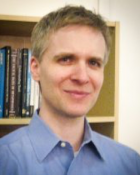
Michael Rescorla

Andrew Lavin
Michael Rescorla, Professor of Philosophy, was interviewed by Andrew Lavin. Andrew is a third-year Ph.D. student in the Department of Philosophy. His research interests are in the Aristotelian tradition and in the philosophy of perception, action, and cognition.
AL: I know you came most recently from Santa Barbara, but where are you from originally and where else have you taught?
MR: I grew up in Philadelphia mainly and then I went to school in Boston, I attended Harvard for both undergrad and grad school. Then I got the job at UCSB, where I taught for about 13 years before coming here.
AL: So would you advise undergraduates to consider pursuing graduate study at their undergraduate institution or to prioritize other schools?
MR: As a general rule it’s probably better to go somewhere else. I had a good experience, but I think most people would say in general it’s better to go to a different school. I had a good working relationship with my advisors as an undergrad. I liked what they were doing, and I thought it was a good idea to continue working with them. Additionally, being in Boston, MIT is just down the street so I could take a lot of classes there and get exposure to some other viewpoints.
AL: So what got you interested in philosophy originally?
MR: I got interested in it in high school. At that age like many people I was interested in Nietzsche and the like. After that I became more aware of analytic philosophy—for example, I got interested in Wittgenstein and even some Quine and Putnam. By the time I got to college I already had a pretty good idea that I wanted to pursue philosophy.
When I started at Harvard I took deductive logic from Warren Goldfarb and that blew me away. To see all the different modes of expression and different patterns of reasoning that one can capture using this pretty simple calculus. That was a pretty eye opening experience—that you could bring this sort of scientific rigor to the analysis of argument and reasoning. After that I got hooked on more formal approaches to philosophy.
I was also very interested in math. I minored in math. One of the things I’ve always loved about philosophy is that you can dabble in different areas. I feel like you could never get bored with philosophy because if you got bored with one topic you could move onto almost literally any other topic that one might be interested in and attempt a philosophical analysis of it. One of the reasons I decided to pursue philosophy as a career is the fact that there’s such an inexhaustible range of topics.
AL: So what is your research about more broadly and then what are you working on right now?
MR: Most of my research in one way or another centers on the mind’s capacity to represent the world. Historically, most philosophers have felt that this is a really central feature of the mind. And in modern cognitive science you find this old idea being vindicated. You find some pretty powerful theories of perception, deductive reasoning, action, navigation, etc. And these theories are couched in terms of this notion of mental representation.
A lot of my work is trying to look at cognitive science, or other areas like say computer science or even probability theory, to see how representation ends up playing a central theoretical role and to look at how that might shed light on traditional philosophical debates about mental representation.
The other focus of my work has been Bayesian Decision Theory, which originated with Rev. Thomas Bayes a few centuries ago (he’s a rough contemporary with Hume). He used probability theory to codify our reasoning about matters about that are uncertain–it might rain tomorrow or it might not—and he wanted to codify this kind of reasoning very rigorously. The key theorem that he discovered got named after him: Bayes’s Theorem. The decision theory based on that theorem is called Bayesian Decision Theory. It gets used in economics, medicine, engineering, cognitive science, and robotics. A lot of my work is about how Bayesian tools get used in cognitive science. I focus especially on the representational and normative foundations of Bayesian Decision Theory.
“I have a paper right now asking : What are mental representations how should we understand these things? What kind of role they really play in cognitive science theorizing?”
AL: What exactly do you mean by "normative foundations"?
MR: Bayesian Decision Theory has norms governing how you should update beliefs about probabilities given new evidence. For example, there’s a norm that says given new evidence of a certain kind, here’s how you should reallocate probabilities or here’s what your new probabilities should be. By “norm,” I mean there’s a rule for what you should do. And I have some work I’m doing right now on the topic of why we should follow these norms.
AL: Do you have any projects or papers you're working on right now?
MR: One idea that people have had, one that goes back at least to the medieval era, is that people have mental representations. In other words, they have items in the head or mental items that represent the world. I have a paper right now asking: what are mental representations? How should we understand these things? What kind of role do they really play in cognitive science theorizing? I look at some case studies where I think they play a role and try to elucidate how we should understand representations in these cases. I try to cash out what all this talk of mental representations comes to. I see that as one of the key foundational questions for cognitive science. Mental representations are entities that some philosophers find to be very natural and intuitive but others find to be a very strange and implausible. I try to give a conception of mental representations that is fairly anodyne. One that large swaths of people should be willing to accept.
AL: So, recognizing that there could be something to worry about for a certain conception of mental representations, but trying to show that if we understand it in a different way then everyone should be on board with it.
MR: Yeah, some people, such as Fodor, have attributed a lot of properties to mental representations that we might not want to attribute to them. And that’s part of the reason why these items have been so controversial. I think that there’s a relatively noncontroversial notion of mental representation that maybe not everyone, but lots of people, should be willing to accept.
AL: Philosophically what have you been reading?
MR: I haven’t had a lot of time outside of the cognitive psychology and philosophy of psychology that I read for my work. I’ve recently been reading the last chapter of Kathrin Kozlicki’s The Structure of Objects, where she explores the notion of structure as it arises in music theory, linguistics, chemistry, mathematics, logic, and some other fields. It’s really illuminating
AL: What about your non-philosophical reading?
MR: I read a lot of online political articles and the like. I have two young kids though, so when I’m reading something not work related, I always feel like I should be reading something that relates to my research.
AL: If you had to recommend a philosophical piece for some beach reading, does anything come to mind?
MR: One book that I like a lot which is also quite accessible to almost anyone who is interested in philosophy is Making Things Happen by James Woodward. It’s about the nature of explanation, especially causal explanation. Pretty much anyone with some philosophical training can pick it up, and it goes through a lot of examples and is written in a very accessible and enjoyable way. I think that’s one of the best philosophical books in the past fifteen or so years.
AL: Do you have any advice for undergraduates interested in pursuing graduate study in philosophy?
MR: It’s good to take a range of philosophy classes so you get a sense of all the different topics people are working on right now. What you’re interested in right now might not be what you’re interested in in the future or what you end up writing on. I also think it’s good, though, to take classes in areas outside of philosophy that bear on what you’re interested in. For me, I was interested in the philosophy of mathematics, so I ended up taking a lot of math. If you’re interested in philosophy of mind, then you should take courses in cognitive science and psychology, if you’re interested in political philosophy, then you should take political science and economics classes, and so on. Philosophy interfaces with a lot of different disciplines, so your undergraduate years are a good time to get exposure to them. It’s good to have a balance where you not only take a good range of philosophy course, but also courses outside of philosophy that will help make your philosophy better.
AL: Any advice for undergraduate majors interested in pursuing other career paths?
MR: Fortunately, it seems like most employers know that a philosophy degree is good training and preparation for a lot of fields. For people interested in law, law schools know that philosophy is great training for work in law. Clear reasoning, clear writing, and clear thinking are all invaluable.
There’s a sort of cliché in popular culture that philosophy majors are unemployed and destitute and that philosophy is a useless degree, but I think the data speaks quite to the contrary. Philosophy majors do quite well in the job market. American philosophy departments have emphasized teaching these skills that are very transferable and that are useful in almost any field that you might go into.



